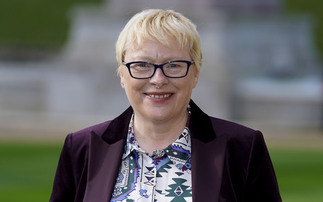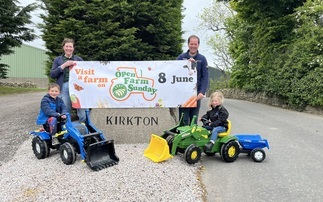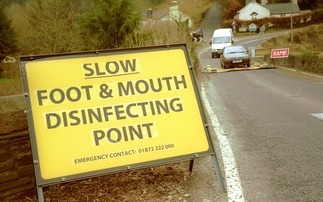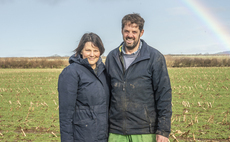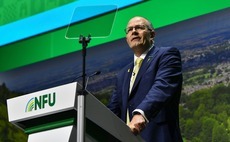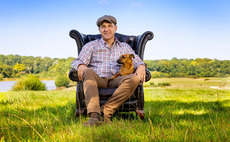
"Far too many rural citizens and businesses are still stuck with outdated internet infrastructure, not being able to fulfil day-to-day tasks as easily as people living in our towns and cities."
A coalition of rural, wildlife and conservation bodies have called on the UK Government to urgently review the rollout of mobile network infrastructure to the most remote hills and glens in Scotland.
Rural and conservation groups including Scottish Land and Estates, RSPB Scotland, Mountaineering Scotland, the National Trust for Scotland, Ramblers Scotland and Woodland Trust Scotland have written a joint letter to the Digital Infrastructure Secretary Chris Bryant, asking the Government to review the ‘total not-spot' (TNS) element of the Shared Rural Network programme (SRNP).
The SRNP is a collaboration between the UK Government and four mobile phone operators including EE and O2, which aims to achieve 95 per cent 4G mobile phone coverage across Britain.
READ NOW: Government ramps up rural broadband rollout
In Scotland, there are 260 sites classified as TNS, which are often selected mainly to provide landmass coverage and meet the geographical targets of the programme, rather than prioritising coverage for communities or transport routes.
The coalition also said extremely remote and ecologically fragile areas are set to accommodate 'unnecessary' masts, along with related infrastructure and access roads, leaving a 'significant mark' on these unique wild places.
Whereas the partial not-spot (PNS) programme has been claimed to improve coverage and make seamless connectivity a reality for many users in communities across Scotland.
According to the groups, the UK Government has not considered whether people living in rural areas need the masts due to a claimed 'target-led and top-down' approach.
The coalition has argued that the widespread agreement between different organisations – all with diverse interests – highlights the need for a review and to assess how the financial resources behind this segment of the SRNP can be better used.
Sarah-Jane Laing, chief executive of Scottish Land and Estates, said: "The SRNP has been vital in improving mobile connectivity for many communities and businesses across Scotland but it risks undermining that achievement by placing expensive masts in locations where there is no demand for them and where the infrastructure will be a blot on the landscape.
"This could potentially cause irreparable damage to special, and often untouched, places.
"We are urging the Government to undertake a review of the TNS programme and take a pragmatic approach rather than simply pushing forward in order to achieve ill-devised targets."
Thomas Widrow, head of campaigns for the John Muir Trust, added: "Decisions taken in Westminster are impacting beautiful and incredibly important wild places hundreds of miles away.
"As a charity whose purpose is to protect wild places, we are alarmed that damage will be inflicted on landscapes and wildlife with no evident public or environmental benefits.
"Rural communities and outdoor enthusiasts alongside environmental organisations are speaking with one voice – we need connectivity where we live and work, not in our most fragile and remote wild places.
"The new UK Government should listen to this unprecedented alliance of voices to pause and review the TNS programme.
"Wild places, the biodiversity they shelter and the people they benefit deserve nothing less."
Duncan Orr-Ewing, head of species and land management at RSPB Scotland, adds: "While initially well-intentioned, the SRNP mast roll out has subsequently raised significant concerns, with development proposals coming forward that we believe will impact some of our most threatened species and habitats, and in places where we believe that the case for these mast developments is weak.
"We stand together with landowners, communities and other conservation environmental non-Governmental organization in calling on the UK Government to review the current programme, and to listen to the genuine and deep felt views of the various stakeholders in Scotland."
Earlier this year, the UK Government said more than 300,000 rural homes and businesses were set to receive major internet speed upgrades as part of the Government's £800-million plan to ‘power up' all regions of Britain.
The fund had aimed to modernise broadband infrastructure in rural areas of England, Scotland and Wales and could provide access to lightning-fast gigabit-capable broadband.
As part of the ‘Project Gigabit', the Government said the money could help close the ‘digital divide' and help to kickstart economic growth.
The Digital Infrastructure Secretary said: "Far too many rural citizens and businesses are still stuck with outdated internet infrastructure, not being able to fulfil day-to-day tasks as easily as people living in our towns and cities."
Kerry Booth, chief executive of the Rural Services Network, said it was vital the rollout was stretched to all ‘hard to reach' areas.
"The isolation faced by rural communities, exacerbated by inadequate digital infrastructure, has a profound impact on the well-being of residents and the potential prosperity of local businesses," she added.
"Ensuring that even the most remote areas benefit from these upgrades will be key to unlocking the full potential of rural areas, fostering economic growth, and enhancing the quality of life for all who live and work there.
"We look forward to seeing how this investment will be rolled out and remain committed to advocating for comprehensive coverage that includes even the most challenging locations."
NFU vice-president Rachel Hallos said it was great to see the Government had recognised the importance of modernising rural specific policies.
"Broadband is not the only route to improve rural connectivity, however, and we look forward to hearing from the Government their plans on delivering 5G across the country," she added.
"With three-quarters of farmers reporting mobile signal gaps on their farms, coverage has never been more important to enable farmers to meet their online legal and regulatory obligations, on top of giving them a lifeline to call for help in a time of crisis."
The Department for Science, Innovation and Technology has been approached for comment.
READ NOW: Poor mobile and broadband connectivity holding back farmers









